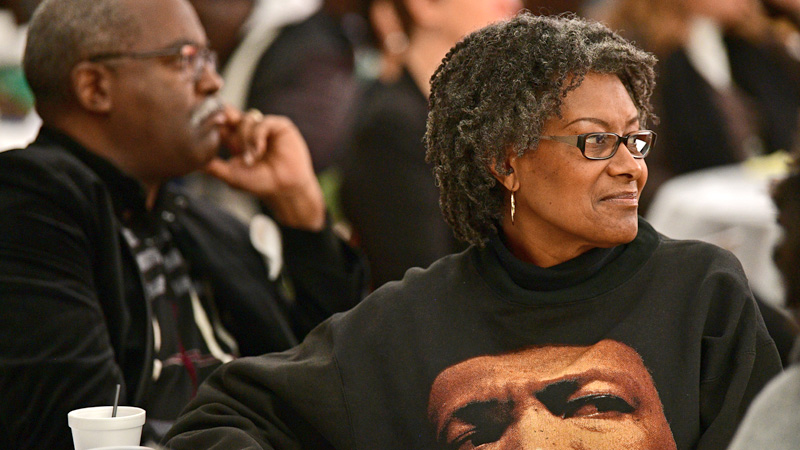Workshop honors King, focuses on economic equality

YOUNGSTOWN — Shortly before his assassination, Dr. Martin Luther King Jr. saw a need to move the focus of the civil-rights movement in what many consider a bolder direction: the importance of allowing marginalized people to have greater economic equality.
Attaining better economic opportunities also was a main mantra of the 36th annual Community Workshop Celebrating the Life & Legacy of the Rev. Dr. Martin Luther King Jr. gathering Monday morning at First Presbyterian Church of Youngstown, 201 Wick Ave.
Sponsoring the three-hour program was the Martin Luther King Jr. Planning Committee of Mahoning County. Its goals include embracing a broader understanding of King’s ideals and philosophies, empowering young people to live and act with awareness of those concepts and engaging area residents to further embrace King’s messages on reaching social justice via the six principles of nonviolent activism.
The workshop, with a theme of “Remembering What is Civil and Doing What is Right,” focused on ways to deal with and tackle institutionalized racism. The problem includes policies, procedures and practices that have a disproportionately deleterious effect on minorities’ access to and quality of goods, services and opportunities.
Specifically, the workshop concentrated on economic opportunities and reforms to the criminal-justice system.
“African Americans still have the lowest economic power in the U.S.,” said the Rev. Todd Johnson, pastor of Second Baptist Church in Warren, who spoke about economic justice.
He noted that core components of attaining that goal include understanding and teaching others the correlation between their vote and their potential economic opportunities, demanding a larger voice in the administrative side of educational operations, a better understanding of marketing trends and developing portfolios, and forming a “productivity mindset” as related to using technology for more sophisticated job training sessions in urban communities.
Too often, disparities in technological capabilities in schools set especially minorities behind and make it harder for them to be uplifted economically, the Rev. Mr. Johnson contended.
Mr. Johnson, who also worked in banking, said he saw a more subtle form of institutionalized racism regarding protecting oneself from falling for a variety of scams. Often, white customers were shown ways to avoid being victims, yet blacks were merely warned about them, he explained.
Also needed is to stress a greater understanding of budgeting money, along with mechanisms to allow people who temporarily need public assistance to more smoothly transition to reaching economic parity and independence, he continued.
“My thoughts are, if we believe addiction is a disease, why send people to prison? We need to do a better job of educating the public about the disease; we need to do a better job in reforms,” said Judge John M. Durkin of Mahoning County Common Pleas Court, whose topic was on changes to the criminal-justice system, including fairer drug-sentencing laws.
Judge Durkin, who presides over the county drug court, noted that the recidivism rate for those who complete his court is less than 10 percent. By contrast, more than 70 percent of people merely incarcerated for such offenses commit new felonies within three years, he continued.
“For 21 years, I’ve believed in reform,” said the judge, who also mentioned Ohio Senate Bill 341, which would reform the state’s drug-sentencing laws.
In addition, Ohio ranks at or near the top in annual opioid, heroin and fentanyl deaths. Also, about half of the children in foster care in 2016 were placed because of their parents’ addiction problems, Judge Durkin continued.
“We clearly need to do more, but my hope for this morning is for what I’ve done the past 21 years: to continue to transform lives,” he added.
Those in the criminal-justice break-out session proposed solutions such as making re-entry into society easier for people coming out of prison, addressing family violence earlier, giving young people the gifts and skills to move forward and helping them feel like a valued member of society.
Solutions regarding economic opportunities were acquiring greater access to help in getting out of debt, using technology to attain greater financial uplift, creating committees to look at hiring trends of contractors and others and allowing more people to move from economic dependence to independence.
 43
43
